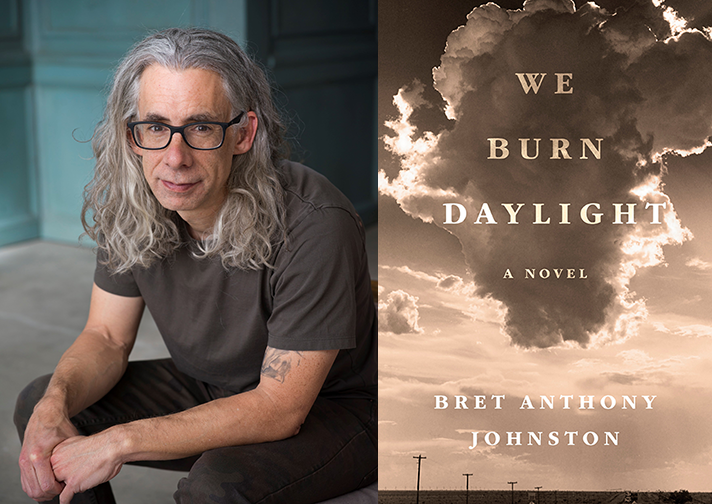This week’s installment of Ten Questions features Bret Anthony Johnston, whose novel We Burn Daylight is out today from Random House. In Waco, Texas, in 1993, fourteen-year-old Roy, the son of the local sheriff, meets Jaye Caroll, who was brought to Waco by her mother to worship the gospel of a former landscaper turned prophet named Perry “Lamb” Cullen. When Roy learns of Jaye’s life on the Lamb’s compound, which includes a cache of weapons, Roy enlists his father’s help to rescue her. Based on the events surrounding the seige of the Branch Davidian compound thirty years ago, We Burn Daylight is a love story with an explosive twist. Geralding Brooks calls it “an epic act of empathy.” Bret Anthony Johnston is the author of two previous books: the novel Remember Me Like This (Random House, 2014) and the story collection Corpus Christi (Random House, 2004). A graduate of the Iowa Writers’ Workshop, Johnston is the recipient of a National Endowment for the Arts Literature Fellowship, a 5 Under 35 honor from the National Book Foundation, and the Sunday Times EFG Short Story Award. He wrote the documentary film Waiting for Lightning (2012) and is the editor of Naming the World and Other Exercises for the Creative Writer (Random House, 2008). Born and raised in Texas, Johnston is the director of the Michener Center for Writers at the University of Texas in Austin.

Bret Anthony Johnston, author of We Burn Daylight. (Credit: Credit: Nina Subin)
1. How long did it take you to write We Burn Daylight?
It took about ten years, but in my defense I also learned a handful of very mediocre skateboard tricks during that time.
2. What was the most challenging thing about writing the book?
The most challenging thing was, well, the thing itself. I find writing impossibly difficult; it is, without question, the hardest thing I’ve ever chosen to do. That I’ve never expected this work to be fast or easy is a priceless gift, my saving grace.
3. Where, when, and how often do you write?
I usually work in my home office, and most days I do two shifts, one in the morning and another in the evening. It’s rare for me to take a day off, but that shouldn’t be mistaken for any kind of admirable work ethic. It’s self-preservation. Because I know I’ll return to the pages tomorrow, it takes pressure off what I write today.
4. What are you reading right now?
I tend to read multiple books at a time, spending different hours of the day with different writers. Right now I’m reading Jack Gilbert, Olga Ravn, and Jill McCorkle’s wonderful collection Old Crimes. I recently read all of Daniel Mason’s novels because North Woods was transcendent.
5. Which author or authors have been influential for you, in your writing of this book in particular or as a writer in general?
Robert Stone will always be my biggest influence, but I keep hoping the writers I love will influence me more. My pages would really benefit from a more recognizable Stone or Chekhov or Toni Morrison influence. No matter how many times I read them—or Tolstoy or Jorie Graham or Julie Otsuka or Michael Ondaatje—their influence refuses to rub off.
6. What is one thing that surprised you during the writing of We Burn Daylight?
As a writer, I chase surprise. It’s one of the things that makes this miserably slow and difficult work so alluring. The characters in this novel repeatedly surprised me, but the one that comes to mind happens very near the end. I thought I knew how much one character would risk, but in hindsight, I’d drastically underestimated them.
7. What is one thing your agent or editor told you during the process of publishing this book that stuck with you?
“So, okay, the descriptions of Texas weather are nice and all, but there are kind of a lot of them. Like, a lot.”
8. If you could go back in time and talk to the earlier you, before you started We Burn Daylight, what would you say?
“Listen up, bonehead: In a few years, when you’re about 100 pages into the draft, some jackass is going to break into your rental car and steal your laptop, so let’s go ahead and back up that stupid file. Also, you should cut a lot of those descriptions of the weather.”
9. What forms of work, other than writing, did you have to do to complete this book?
I made multiple trips to the Mount Carmel site outside Waco, including a visit on the 25th anniversary of the fires, which was surreal and sad and revelatory. I also learned to pick locks in a basic way, but apparently I went overboard there, too. Another early note I received was: “What if we had, like, half as many lockpicking scenes?”
10. What’s the best piece of writing advice you’ve ever received?
Allan Gurganus said, “When you have the choice to think or trust your way out of a writing problem, always choose trust.”







